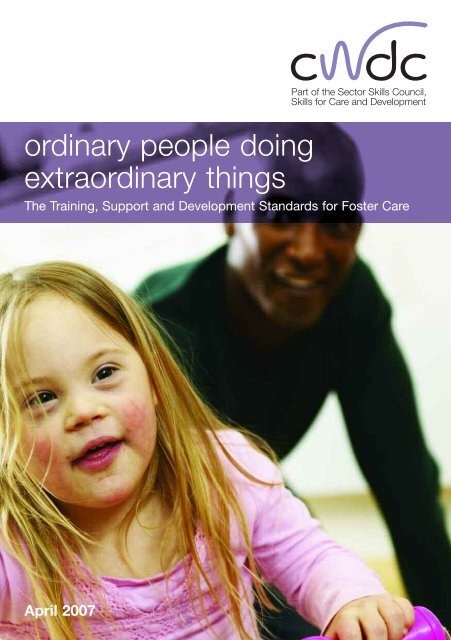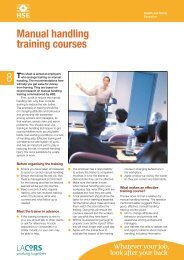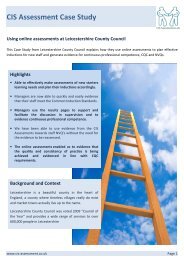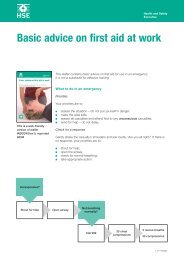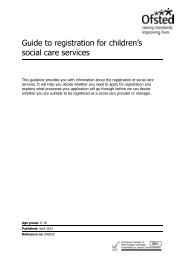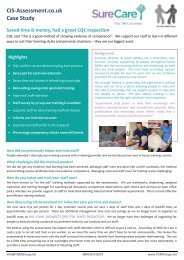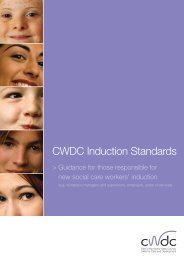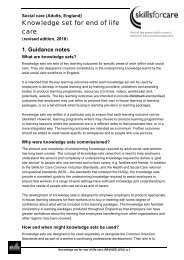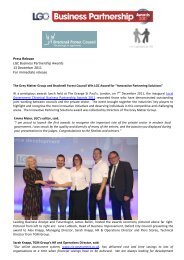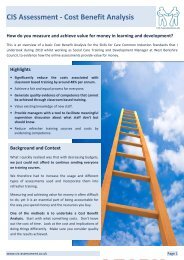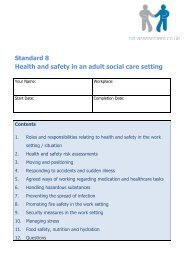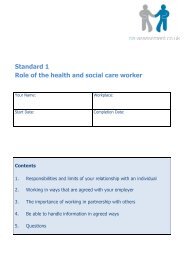ordinary people doing extraordinary things
Ordinary People Doing Extraordinary Things The ... - CIS Assessment
Ordinary People Doing Extraordinary Things The ... - CIS Assessment
Create successful ePaper yourself
Turn your PDF publications into a flip-book with our unique Google optimized e-Paper software.
<strong>ordinary</strong> <strong>people</strong> <strong>doing</strong><br />
extra<strong>ordinary</strong> <strong>things</strong><br />
The Training, Support and Development Standards for Foster Care<br />
April 2007
In 2007, the Children's Workforce Development Council (CWDC) will<br />
launch the first set of England-wide Standards to support the training<br />
and development of Foster Carers. Keep reading this leaflet to find<br />
out more about the Standards and how they could impact on you…<br />
The new Training, Support & Development Standards for Foster Care<br />
have been designed to support Foster Carers from approval through their<br />
first two years of fostering. They provide employers with a framework to<br />
guide training and professional development for Foster Carers. This will<br />
mean Foster Carers have the best possible training, information and<br />
knowledge they need to truly make a difference to the lives of the children<br />
and young <strong>people</strong> they care for.<br />
Benefits of the new standards<br />
The new Standards will:<br />
• Provide consistency and quality of training for Foster Carers<br />
across England.<br />
• Provide access to the most up-to-date information, advice and<br />
guidance for Foster Carers.<br />
• Allow opportunities for career progression and development by<br />
providing underpinning knowledge and skills.<br />
• Improve the status of Foster Carers as trained professionals and<br />
a valued part of the children’s workforce.<br />
The new Standards have been adapted from the CWDC Induction<br />
Standards and build on the Common Core and the guidelines set out in<br />
the United Nations Convention on the Rights of the Child. They use<br />
examples of current good practice and provide a comprehensive<br />
framework to guide the training and development of Foster Carers.
Foster Care Standards – FAQs<br />
Do the Training, Support & Development Standards apply<br />
to all Foster Carers?<br />
Yes. The Standards are a national benchmark and will give you the<br />
recognition you deserve, as well as ensuring that your knowledge and<br />
skills are up to date. The framework which accompanies the Standards<br />
will help you to set out your personal development plan for the future and<br />
acknowledge that your learning and development is an ongoing process.<br />
How do I study?<br />
Training is not just attending courses. Foster Carers are individuals who<br />
all learn in different ways and the Standards recognise this by allowing<br />
you to be flexible in the way that the Standards are evidenced. The<br />
workbook which accompanies the Standards sets out a simple way to<br />
show how examples of meeting every day challenges can be used to<br />
evidence the skills and knowledge that you have.<br />
How will the Training, Support & Development Standards be assessed?<br />
You will progress through the workbook with your link worker/supervising<br />
social worker, planning ways for you to learn each of the areas within the<br />
Standards. You will then record examples of how your learning has been<br />
put in to practice and what the outcomes of your learning have been.<br />
The final workbook will then be assessed by someone in your Local<br />
Authority Foster Care Service or your Independent Fostering Agency.<br />
Do the Standards lead to a qualification?<br />
No, but the Standards for Foster Care have been carefully mapped to<br />
units within the Health and Social Care NVQ. This means that if you<br />
choose to take the NVQ qualification, you will be able to use the work<br />
that you have done in completing the Standards as evidence towards<br />
meeting the knowledge requirements of the core units of the NVQ at<br />
each level. Similarly, if you are already working towards your NVQ you<br />
will not have to duplicate your learning in completing the Standards.<br />
What happens if I fail?<br />
The Standards have been developed in a way which makes them<br />
accessible and achievable for all Foster Carers. They should easily sit<br />
within your existing annual review and should help you identify future<br />
development opportunities to enhance your existing skills.
How can you find out more?<br />
The new Foster Care Standards will be available from May 2007,<br />
with the supporting workbook being published from June 2007.<br />
CWDC are producing a range of products to support the Standards including:<br />
• A Standards book containing information on the principles and<br />
purpose of the standards including their content and structure.<br />
• A guide for Foster Carers.<br />
• A guide for Managers, Supervising Social Workers and Trainers.<br />
• A workbook for Foster Carers.<br />
All these resources will be available to download free at<br />
http://www.cwdcouncil.org.uk/projects/fostercare.htm<br />
Alternatively to request your free pack or to find out more contact the<br />
Foster Care Team:<br />
• Tel – 0113 244 6311<br />
• Email – fostercare@cwdcouncil.org.uk
CWDC’s vision is to build a world-class workforce<br />
for children, young <strong>people</strong> and families.<br />
CWDC exists to improve the lives of children, young<br />
<strong>people</strong>, their families and carers by ensuring that all<br />
<strong>people</strong> working with them have the best possible<br />
training, qualifications, support and advice. It also<br />
helps children and young <strong>people</strong>'s organisations and<br />
services to work together better so that the child is<br />
at the centre of all services.<br />
For more information please call:<br />
0113 244 6311<br />
Or visit www.cwdcouncil.org.uk<br />
Or write to CWDC, 3rd Floor, Friends Provident House, 13-14 South Parade,<br />
Leeds, LS1 5QS or email fostercare@cwdcouncil.org.uk<br />
© This publication is the copyright of the Children’s Workforce Development Council 2007.<br />
We like our communications to have an impact on you – but not on the environment – which is why this document is printed on 100% recycled paper.<br />
SC01/0407


